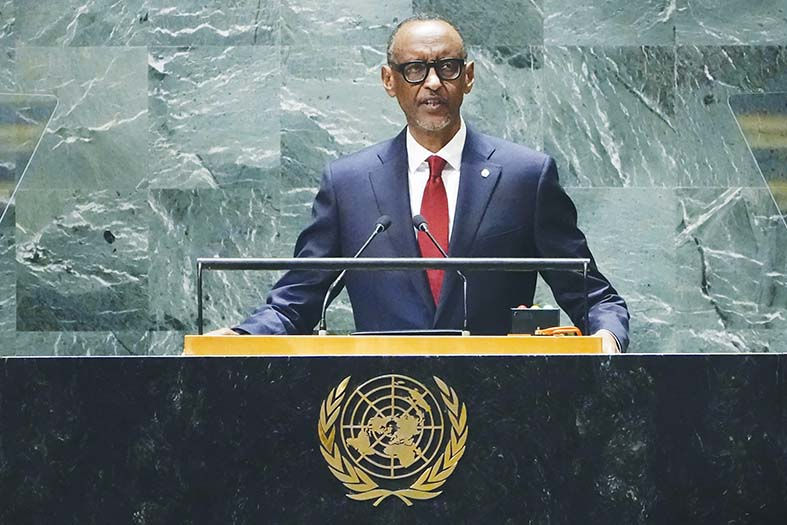The Rise of Rwanda: Quiet Power in a Shifting Africa
- Sumant Vidwans

- Jul 27
- 3 min read
In a continent where power is often loud and large, Rwanda’s quiet precision is quietly reshaping the rules.

In a continent where power is often measured by size, resources, or economic weight, Rwanda is an anomaly. Landlocked, sparsely populated, and still marked by the 1994 genocide, it has nonetheless emerged as one of Africa’s most strategic diplomatic actors. Under President Paul Kagame, Rwanda wields a “quiet power”—a ”calculated mix of subtle military assertiveness, diplomatic agility, and a modern image. Avoiding open confrontation, it expands its influence through precision, strategic deployments, and a reputation for efficiency. As African geopolitics quietly shifts, Rwanda’s rising role merits closer attention.
Rwanda’s diplomatic stance stems from its post-1994 transformation. The genocide against the Tutsi, which killed around 800,000 people, left the state shattered and society divided. Kagame, a former guerrilla leader and head of the Rwandan Patriotic Front, rose to power promising unity, security, and rebuilding.
Over the next two decades, Kagame’s government reshaped Rwanda’s global image. Once defined by tragedy, it became known for clean streets, efficient governance, and rapid growth. Donors praised its results-driven approach, while Rwanda branded itself a model of African success. Beneath this, however, lies a hard-edged statecraft, evident in its expanding global presence.
Military power abroad
Rwanda extends its influence through strategic military deployments and is now among Africa’s most active contributors to international peacekeeping, especially in conflict zones needing swift intervention.
It has shown rapid, targeted military capability in the Central African Republic (CAR) and Mozambique. In CAR, hundreds of Rwandan troops have helped defend Bangui and support the fragile government, some under UN command, others via bilateral deals—highlighting Kigali’s independent reach.
In Mozambique, Rwandan forces, deployed in 2021 at the government’s request, played a key role in reclaiming towns from insurgents in Cabo Delgado, succeeding where local troops had long struggled. In both missions, Rwandan troops have been praised for discipline, clarity, and superior equipment.
Rwanda’s interventions have earned it a reputation as a dependable security provider. Critics, however, argue these missions also serve their interests—securing resources, influence, and alliances. In the CAR, for instance, Rwanda is said to have gained mining concessions and pursued exiled opponents, all while maintaining an image of disciplined leadership. Unlike regional blocs that take months to act, Rwanda has shown speed and clarity, winning allies across Africa.
The diplomatic playbook
Military efficiency is only part of Rwanda’s strategy. It has also built soft power by hosting major events like the 2022 Commonwealth Heads of Government Meeting and positioning itself as a hub for pan-African dialogue.
Rwanda has cultivated diverse diplomatic ties. Its relationship with India has grown through cooperation in agriculture, education, and digital services. Links with Israel have strengthened, especially in security tech. Newer ties with Qatar and Turkey signal a pivot towards non-traditional partners.
Notably, Rwanda has deepened cooperation with Russia. Though this has raised concerns among Western allies, Kigali frames its partnerships as pragmatic, not ideological. In the CAR, Rwandan troops operate alongside Russian advisers, including those formerly linked to Wagner. This flexible approach lets Rwanda expand its reach without relying too heavily on the West.
Rwanda’s growing confidence has sparked diplomatic friction. In March 2025, it expelled several Belgian diplomats over criticism of its domestic politics, drawing Belgian rebuke but standing its ground. Its recent, controversial exit from the Economic Community of Central African States (ECCAS) was framed as a response to the bloc’s politicisation by rival states.
These moves highlight Kagame’s readiness to defy regional norms and Western expectations. Though still a major aid recipient, Rwanda’s foreign policy increasingly reflects strategic autonomy—willing to partner where interests align but firmly resisting outside interference.
Rwanda’s assertive diplomacy faces criticism. Domestically, political space is tightly controlled. Opposition figures like Victoire Ingabire face legal hurdles, independent media is scarce, and dissent is often silenced.
Abroad, human rights groups accuse Rwanda of targeting exiled dissidents. While praised for peacekeeping, its alleged role in regional conflicts, especially in eastern Congo, draws scrutiny.
This dual image—a disciplined, development-driven state abroad and a repressive one at home—complicates Rwanda’s model-state narrative. Its diplomatic efficiency is seen by some as a sign of deeper authoritarianism.
Rwanda isn’t building an empire, but it is seeking influence. As Africa enters a multipolar era, Rwanda is helping reshape the rules. Whether its “quiet power” can endure remains to be seen. For now, the world watches with quiet suspicion.
(The writer is a foreign affairs expert.)




Comments